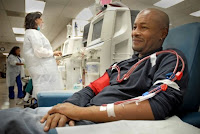Diabetes, medically known as diabetes mellitus, is a
metabolic disorder that prevents glucose from breaking down correctly in the
body. The body may not respond to insulin properly or the body may not produce
enough insulin to control the blood sugar. When the condition is left untreated
or an incorrect or inadequate treatment is prescribed, the continuous or
recurring events of high blood sugar can do quite a bit of damage.
The most common problem in people with diabetes is that the
sugar levels within the bloodstream begin to cause issues with the
cardiovascular system. Oftentimes, high cholesterol goes hand-in-hand with
diabetes. When the vessels become damaged, blood may not be able to pump efficiently.
Multiple Organs Affected
In addition to the heart, the vessels in other organs may
also be affected. This leads to the entire organ potentially functioning
improperly. For instance. the kidneys are comprised of many tiny blood vessels
that work hard to filter the waste from the blood. Not only do they filter
waste, but they also filter out excess fluid. When diabetes health is not taken
care of properly, it can cause damage to the tiny vessels in the kidneys. This
means that the waste and toxins will build up in the blood.
Besides the interruption of filtering the blood, the effect
of hyperglycemia on the blood vessels and the nerves can lead to numbness and
tingling in the extremities. When diabetes health is not managed properly, this
nerve damage leads to pain and a burning sensation in the affected area. In the
most severe cases, a patient may lose all feeling in the limb. This can lead to
an injury, sore or infection arising and the patient being unaware until
physical signs occur. With severe cases, amputation of the limb may be
necessary.
Destructive to the Kidneys
According to the American
Diabetes Association, diabetes is destructive to the process of the kidneys
acting as a filter. While the kidneys remove waste and water through the tiny
vessels known as nephrons, they leave protein and red blood cells in the blood,
since these particles are too large to pass through the filtration system of
the kidneys. When diabetes health is not controlled and high blood sugar levels
get too excessive, they lead to the kidneys overworking and filtering too much
blood. Eventually, beneficial protein slips through the nephrons and is
released from the body with the urine.
The extent of the kidney damage from diabetes varies. In the
early stages, it may go unnoticed. As it worsens, it may turn into end-stage
renal disease or complete kidney failure that requires dialysis or a kidney
transplant to correct.
To prevent kidney problems, patients with diabetes should control their condition with diet and exercise. Moreover, the patient should monitor his or her carbohydrate intake. In addition, he or she must take his or her diabetes medication as prescribed. The treatment options may include glyburide, insulin or metformin. The patient may also take Actos. However, while particular diabetes drug may be effective at regulating diabetes health, it may also lead to cardiovascular problems, including heart attack, stroke and congestive heart failure. Individuals with diabetes who take Actos for many years may experience bladder cancer. Due to this, thousands of lawsuits have been filed. The patient should be monitored for liver damage while he or she is taking the medication. ~DrugWatch.com~







